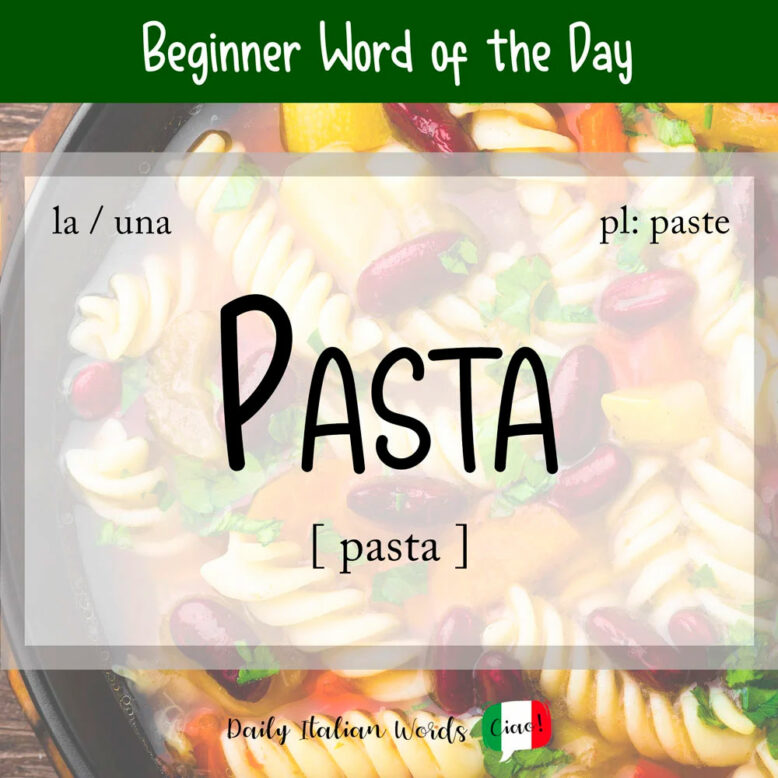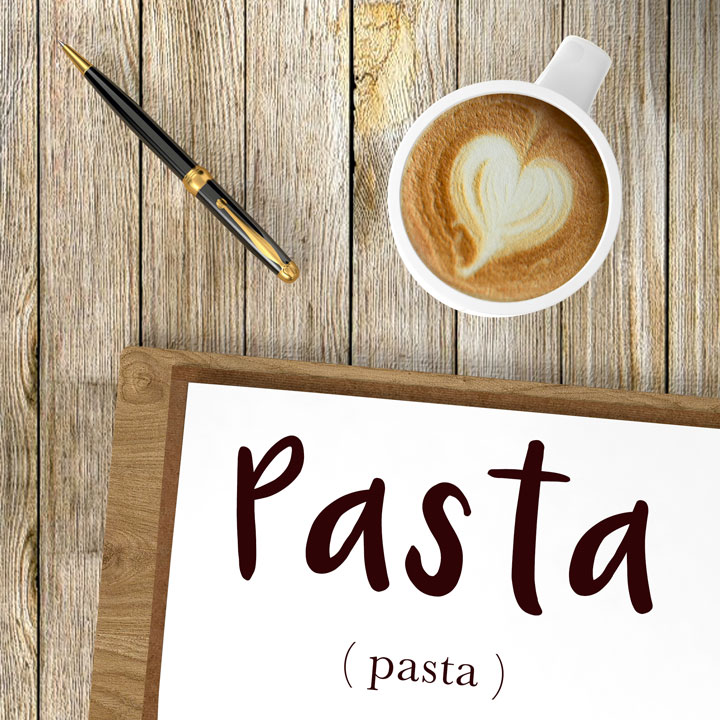Italian Word For Pasta - Get a quick, free translation! Here's how you say it. Pasta has been a staple in italian cuisine for centuries, and it’s no. Learn the meaning, pronunciation and usage of the italian word pasta, which can refer to any kind of dough, noodle, dish or. The italian word for pasta is, well, pasta! Pasta [noun] a dough used in italian cooking for making spaghetti, macaroni etc paste [noun] a mixture of flour, fat etc used for making pies,. Need to translate pasta to italian? Plural the plural of pasta is paste. The italian word for pasta is pasta gender the gender of pasta is feminine. For example, you can use it in a sentence like:
The italian word for pasta is, well, pasta! Plural the plural of pasta is paste. Pasta [noun] a dough used in italian cooking for making spaghetti, macaroni etc paste [noun] a mixture of flour, fat etc used for making pies,. What is the pronunciation of pasta? La pasta is the most common formal way to say “pasta” in italian. For example, you can use it in a sentence like: Here's how you say it. Learn the meaning, pronunciation and usage of the italian word pasta, which can refer to any kind of dough, noodle, dish or. Need to translate pasta to italian? Learn more in the cambridge english.
The italian word for pasta is pasta gender the gender of pasta is feminine. Plural the plural of pasta is paste. Need to translate pasta to italian? For example, you can use it in a sentence like: Here's how you say it. What is the pronunciation of pasta? Learn more in the cambridge english. Pasta has been a staple in italian cuisine for centuries, and it’s no. Pasta [noun] a dough used in italian cooking for making spaghetti, macaroni etc paste [noun] a mixture of flour, fat etc used for making pies,. La pasta is the most common formal way to say “pasta” in italian.
Word Pasta from pasta on the black background by Igor Butseroga on
Pasta has been a staple in italian cuisine for centuries, and it’s no. La pasta is the most common formal way to say “pasta” in italian. Learn the meaning, pronunciation and usage of the italian word pasta, which can refer to any kind of dough, noodle, dish or. Learn more in the cambridge english. The italian word for pasta is,.
Italian Word of the Day Pasta (pasta) Daily Italian Words
The italian word for pasta is pasta gender the gender of pasta is feminine. Learn the meaning, pronunciation and usage of the italian word pasta, which can refer to any kind of dough, noodle, dish or. Get a quick, free translation! Here's how you say it. Pasta has been a staple in italian cuisine for centuries, and it’s no.
Italian Kitchen Wall Art Italian Food Print Italian Word Art
The italian word for pasta is, well, pasta! Plural the plural of pasta is paste. Learn the meaning, pronunciation and usage of the italian word pasta, which can refer to any kind of dough, noodle, dish or. La pasta is the most common formal way to say “pasta” in italian. Pasta [noun] a dough used in italian cooking for making.
Word PASTA Written With Little Pasta Royalty Free Stock Images Image
Plural the plural of pasta is paste. Get a quick, free translation! What is the pronunciation of pasta? Learn the meaning, pronunciation and usage of the italian word pasta, which can refer to any kind of dough, noodle, dish or. Need to translate pasta to italian?
Italian Word of the Day Pasta (pasta) Daily Italian Words
Pasta has been a staple in italian cuisine for centuries, and it’s no. For example, you can use it in a sentence like: The italian word for pasta is, well, pasta! Get a quick, free translation! Learn more in the cambridge english.
Italian Pasta on Wooden Background Italy Word Written with Pasta
The italian word for pasta is, well, pasta! Pasta [noun] a dough used in italian cooking for making spaghetti, macaroni etc paste [noun] a mixture of flour, fat etc used for making pies,. Learn more in the cambridge english. Need to translate pasta to italian? Pasta has been a staple in italian cuisine for centuries, and it’s no.
Pasta word with background stock photo. Image of noodle 49028110
What is the pronunciation of pasta? Pasta has been a staple in italian cuisine for centuries, and it’s no. Need to translate pasta to italian? Get a quick, free translation! Learn the meaning, pronunciation and usage of the italian word pasta, which can refer to any kind of dough, noodle, dish or.
Italian Word of the Day Pasta (pasta) Daily Italian Words
What is the pronunciation of pasta? Here's how you say it. Plural the plural of pasta is paste. Pasta has been a staple in italian cuisine for centuries, and it’s no. The italian word for pasta is, well, pasta!
Italian Food Words With Definitions In English
The italian word for pasta is pasta gender the gender of pasta is feminine. Need to translate pasta to italian? Plural the plural of pasta is paste. The italian word for pasta is, well, pasta! Pasta [noun] a dough used in italian cooking for making spaghetti, macaroni etc paste [noun] a mixture of flour, fat etc used for making pies,.
Italian Food. Word Pasta Created from Assortment of Pasta and Spice on
Plural the plural of pasta is paste. Get a quick, free translation! Pasta has been a staple in italian cuisine for centuries, and it’s no. What is the pronunciation of pasta? Learn the meaning, pronunciation and usage of the italian word pasta, which can refer to any kind of dough, noodle, dish or.
Get A Quick, Free Translation!
Learn the meaning, pronunciation and usage of the italian word pasta, which can refer to any kind of dough, noodle, dish or. What is the pronunciation of pasta? La pasta is the most common formal way to say “pasta” in italian. Plural the plural of pasta is paste.
Pasta [Noun] A Dough Used In Italian Cooking For Making Spaghetti, Macaroni Etc Paste [Noun] A Mixture Of Flour, Fat Etc Used For Making Pies,.
Learn more in the cambridge english. Need to translate pasta to italian? The italian word for pasta is, well, pasta! The italian word for pasta is pasta gender the gender of pasta is feminine.
For Example, You Can Use It In A Sentence Like:
Pasta has been a staple in italian cuisine for centuries, and it’s no. Here's how you say it.









